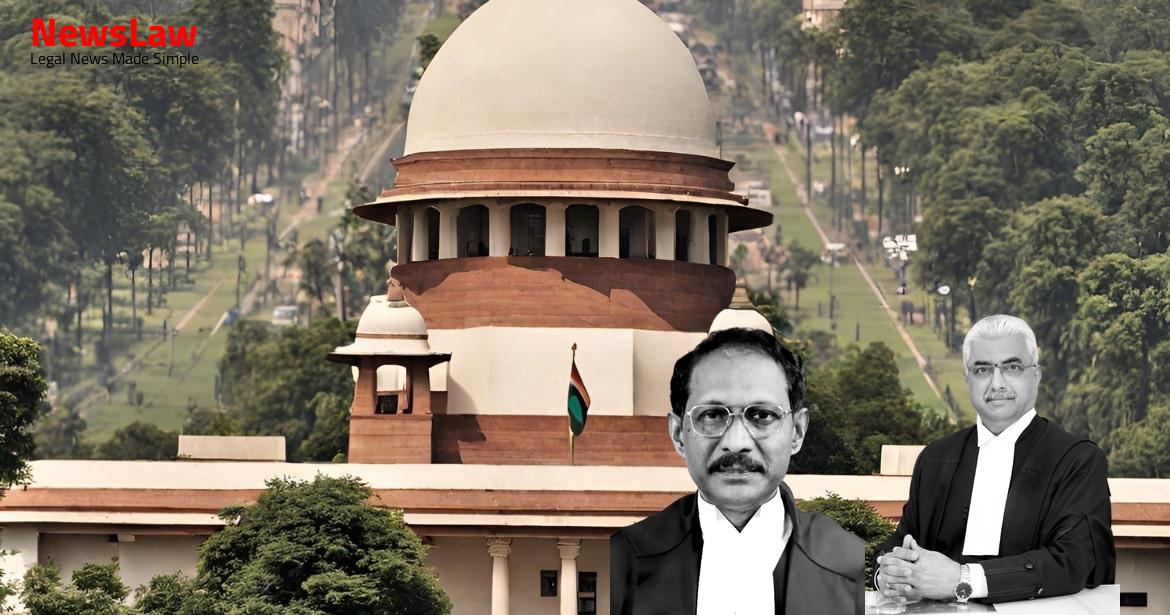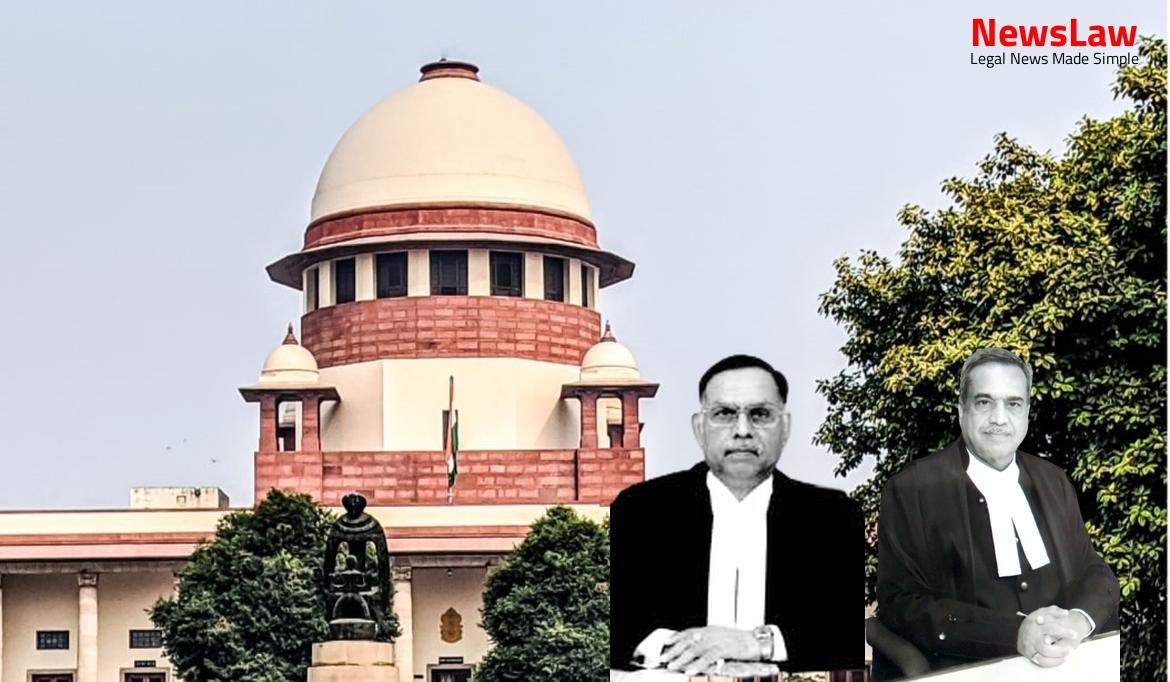In the case of Vasantrao Naik High School vs. the Shriram Manohar Bande, the Supreme Court of India has made a significant ruling on the acceptance of resignations in employment disputes. The case revolves around the appellant challenging the termination of his employment and the subsequent withdrawal of his resignation. The Court’s decision sheds light on the interpretation and application of the MEPS Act and Rules in such scenarios. Let’s delve into the details of this crucial judgement.
Facts
- Appellant challenged the judgment of setting aside his termination by the Tribunal and directing his reinstatement with back wages.
- Appellant withdrew his resignation through a letter dated 25.10.2017, posted on 03.11.2017.
- Appellant was appointed as an Assistant Teacher at Vasantrao Naik High School run by an educational society on a grant-in-aid basis.
- Appellant approached the Tribunal under MEPS Act and Rules against his termination, alleging it to be illegal and based on fabricated documents.
- On 23.11.2017, when attempting to resume service, Appellant was denied signing on the muster roll by the Headmaster.
- On 27.11.2017, Appellant received a letter relieving him from his service following his resignation on 10.10.2017.
- The Tribunal found that the appellant lawfully withdrew his resignation and that the respondents fabricated acceptance documents with malicious intent.
- The Tribunal’s decision to set aside the termination of the appellant was challenged by the respondents in the High Court through a writ petition.
- The High Court reviewed the record and confirmed that the resignation was accepted through a resolution by the school management, complying with the MEPS Act and Rules.
- It was noted by the High Court that the MEPS Act and Rules do not mandate communication of acceptance for a resignation to take effect.
Also Read: Supreme Court Judgement: Case between Appellant and Respondent on Non-furnishing of Crucial Document
Issue
- The issue at hand is whether the resolution dated 13.10.2017 is a manufactured document by the appellant.
- The Tribunal had set aside the termination order based on the claim that the resolution was created as an afterthought by the respondents to show compliance with the MEPS Act and Rules.
- The Tribunal’s conclusion of the resolution being fabricated was based on the respondents’ pleadings in the written statement.
- Although the respondents initially failed to present the resolution along with the written statement, detailed steps taken post receiving the resignation letter were later provided in the additional information.
Also Read: Case Summary: Rabindranath Bose v. Union of India
Arguments
- The appellant argued that there was non-compliance with the provisions of the MEPS Act and Rules regarding resignation acceptance.
- The resignation letter dated 10.10.2017 was withdrawn on 25.10.2017, which the appellant claimed was undisputed.
- Appellant contended that the resolutions passed by the School Committee were back-dated and fabricated to show compliance.
- Appellant claimed he did not receive formal communication from the respondents about the acceptance of his resignation.
- Respondents stated that the School Committee received the resignation letter, and management passed a resolution accepting it.
- The respondents also said the appellant withdrew his resignation, thus they could not stop him from rejoining.
- Appellant was granted 50% back wages by the Tribunal without proof of employment during the period he was out of service.
- The High Court did not consider the inconsistent plea made by the management regarding the approval of the resignation by different committees.
- The appellant’s counsel argued that the High Court erred in not considering vital aspects affecting the administration of justice.
- MEPS Act and Rules do not specify strict rules for communication of resignation acceptance.
- No strict rule states resignation must be accepted only by the management committee.
- Resignation was voluntary and accepted by both management and school committees.
- Appellant estopped from claiming withdrawal of resignation before its acceptance.
- Appellant accused resolution of being manufactured/fabricated.
Also Read: Bail Application Rejected: Analysis of UAP Act Bail Provision
Analysis
- Appellant voluntarily tendered his resignation on 10.10.2017 due to personal difficulties.
- Resignation letter was initially accepted by the management committee on 13.10.2017.
- Subsequently, the school committee also passed a resolution on 14.10.2017 to accept the resignation.
- The High Court found no error in the acceptance of the resignation by both the management and the school committee.
- Employee failed to provide proof of submitting leave application on the same date as resignation letter.
- The Tribunal observed that the resignation was voluntary and the claim of pressurization was vague.
- Employee’s attempts to withdraw resignation post acceptance indicated voluntary decision to resign.
- MEPS Act and Rules have specific procedures for employee resignations to protect both employee and management interests.
- Rule 40 allows for early termination of employment with payment in lieu of notice period.
- Non-communication of resignation acceptance to the employee does not invalidate the termination.
- High Court decision upheld regarding acceptance of resignation by both management and school committee.
- Appellant’s plea for invalid termination post acceptance of resignation was dismissed by the Tribunal and High Court.
- Management involvement in the resignation acceptance process was deemed appropriate.
- Employee’s withdrawal of resignation after acceptance was not deemed valid.
- Employee’s termination date set at 14.10.2017 based on resignation acceptance date.
- Provisions under MEPS Act and Rules dictate the resignation procedure for private school employees.
- Rule 40 allows for termination with payment in lieu of notice before notice period completion.
- School Committee acted in accordance with the rules while accepting the resignation.
- High Court ruling upheld concerning communication of resignation acceptance to the employee.
- Employee’s admission of mistake in seeking withdrawal of resignation letter validated the voluntary nature of initial resignation.
- Non-compliance with MEPS Act and Rules while accepting resignation was not found in the case.
- An employee entitled to vacation cannot give notice of resignation during the vacation or to cover any part of the vacation.
- Management must follow specified notice or payment requirements when allowing an employee to leave service earlier.
- Failure to adhere to notice or payment requirements results in a deduction from the grant due to the school.
- The Court in North Zone Cultural Centre vs. Vedpathi Dinesh Kumar held that resignation becomes effective upon acceptance.
- Communication of acceptance is not necessary as long as rules do not mandate it.
- The acceptance need not be communicated for the resignation to be valid.
- Rules or guidelines governing resignation must specify the need for communication of acceptance for it to be mandatory.
- The contention raised by the appellant about withdrawal of resignation before communication of its acceptance is not valid.
- The position of law established in the North Zone case applies directly to the present case.
- The impugned judgement is sound and does not require any interference.
Decision
- Both points formulated were answered negatively
- 23 findings of the High Court were affirmed
- Present appeal dismissed with no order as to costs
Case Title: SHRIRAM MANOHAR BANDE Vs. UKTRANTI MANDAL (2024 INSC 337)
Case Number: C.A. No.-005355-005355 / 2024



